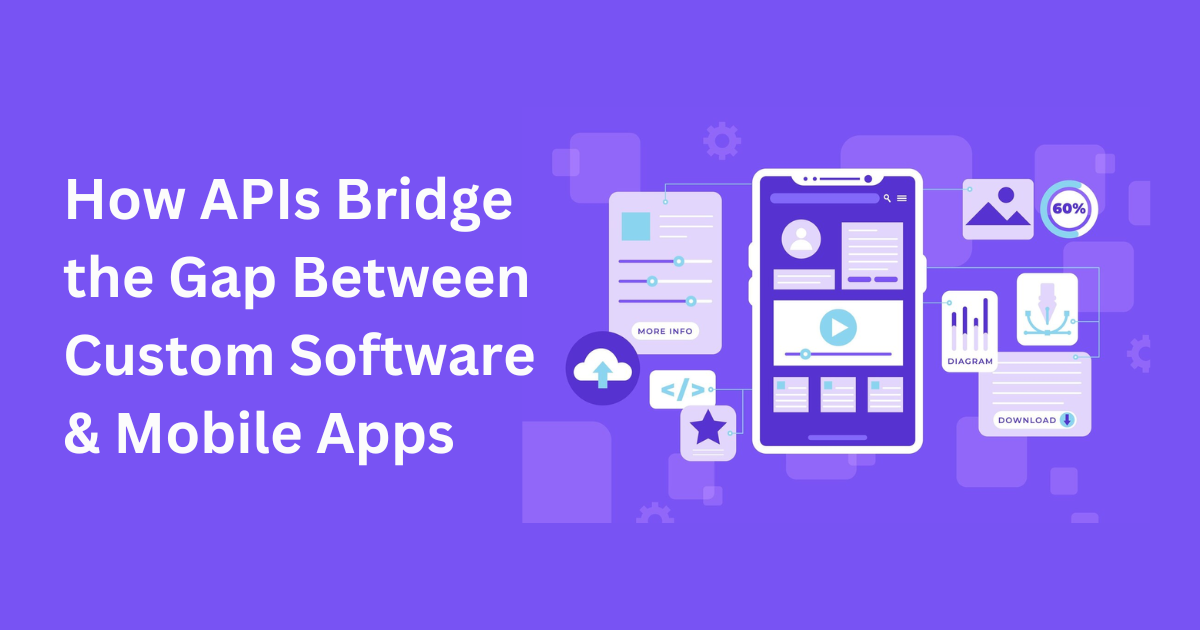How APIs Bridge the Gap Between Custom Software & Mobile Apps

In a world where businesses are increasingly reliant on technology, custom software and mobile apps have become essential tools for driving efficiency, engaging customers, and staying competitive. However, integrating these technologies seamlessly has been a long-standing challenge. The answer? APIs—Application Programming Interfaces. These unsung heroes work behind the scenes, making the impossible possible, bridging gaps between different software systems, and transforming disconnected solutions into powerful, unified ecosystems.
The Role of APIs: Silent Architects of Digital Transformation
APIs are essentially digital messengers that enable different software applications to communicate with each other. Think of them as translators who help two different languages coexist. Whether it’s a banking app pulling transaction details from a financial database or a fitness tracker syncing data with a health app, APIs enable the seamless flow of information between platforms.
Without APIs, custom software and mobile apps would exist in isolation, forcing businesses and users to manually transfer data, leading to inefficiencies, errors, and frustration. With APIs, companies can integrate third-party services, automate workflows, and scale operations effortlessly.
The Need for Seamless Integration: Why Custom Software Alone Isn’t Enough
Imagine a retail company developing custom inventory management software. While this software can efficiently track stock levels, it still needs to communicate with a mobile app for real-time access, vendor platforms for supply chain updates, and customer portals for order tracking. APIs eliminate the need for manual intervention by allowing these systems to “talk” to one another.
Businesses that fail to integrate their systems effectively end up with fragmented data silos—disconnected pools of information that hinder decision-making and create operational bottlenecks. APIs solve this issue by serving as the glue that holds these digital pieces together.
How APIs Enhance Mobile App Functionality
1. Enabling Real-Time Data Exchange
Users expect mobile apps to be responsive and up to date. APIs ensure that mobile apps fetch and display the latest data by syncing with back-end servers, cloud databases, or third-party platforms in real time. Whether it’s stock prices, weather updates, or social media notifications, APIs make instant access to data possible.
2. Integrating Third-Party Services
Modern mobile apps rely on third-party services for various functionalities—payment gateways, map services, analytics, and even AI-powered chatbots. APIs allow developers to embed these capabilities into apps without building them from scratch. A ride-sharing app, for instance, leverages Google Maps API for navigation rather than developing its own mapping solution.
3. Streamlining Authentication & Security
Secure login systems such as OAuth and Single Sign-On (SSO) depend on APIs to verify user credentials across platforms. APIs help mobile apps integrate authentication services like Google, Facebook, and Apple, ensuring security while reducing friction for users.
4. Enhancing User Experience with Personalization
Personalization is at the heart of modern digital experiences. APIs fetch user data from various sources—purchase history, browsing habits, location—and deliver tailored content or recommendations. Think of how e-commerce apps suggest products based on past searches or how streaming apps recommend shows suited to user preferences.
APIs & Custom Software: A Symbiotic Relationship
Businesses invest in custom software development services in California for tailored solutions that align with specific needs. However, these systems rarely operate in isolation. APIs extend their capabilities by integrating them with other essential applications, creating a comprehensive digital ecosystem.
For instance, a healthcare provider with a custom patient management system can use APIs to integrate telemedicine platforms, electronic health records (EHRs), and wearable devices, ensuring a connected experience for both doctors and patients.
The Future of APIs: What Lies Ahead?
The demand for APIs is only growing. With emerging technologies like AI, blockchain, and IoT becoming more mainstream, APIs will play an even bigger role in enabling innovation. API-first development—a strategy where applications are designed with APIs at their core—will become the norm, allowing businesses to build scalable and adaptable solutions from the ground up.
Additionally, APIs are evolving to become more intelligent with the help of machine learning and automation. Self-healing APIs capable of detecting and resolving issues without human intervention are on the horizon, paving the way for even more seamless integration.
Final Thoughts: APIs as the Backbone of Modern Digital Solutions
APIs are no longer optional—they are a necessity for businesses that want to create powerful, interconnected digital experiences. Whether it’s enabling custom software to work seamlessly with mobile apps, facilitating real-time data exchange, or enhancing security, APIs are the backbone of modern digital transformation.
For businesses looking to maximize efficiency and deliver top-tier user experiences, embracing API-driven development is the way forward. Whether you’re building a custom enterprise solution or launching a new mobile app, integrating APIs will ensure that your software remains agile, scalable, and competitive.
Looking to develop a seamless, API-powered mobile app? Our expert app development services Atlanta can help you build a solution that integrates flawlessly with your existing software, ensuring a smooth and efficient digital experience for your users.
- Questions and Answers
- Opinion
- Motivational and Inspiring Story
- Technology
- True & Inspiring Quotes
- Live and Let live
- Focus
- Art
- Causes
- Crafts
- Dance
- Drinks
- Film/Movie
- Fitness
- Food
- Oyunlar
- Gardening
- Health
- Home
- Literature
- Music
- Networking
- Other
- Party
- Religion
- Shopping
- Sports
- Theater
- Wellness
- News
- Culture

